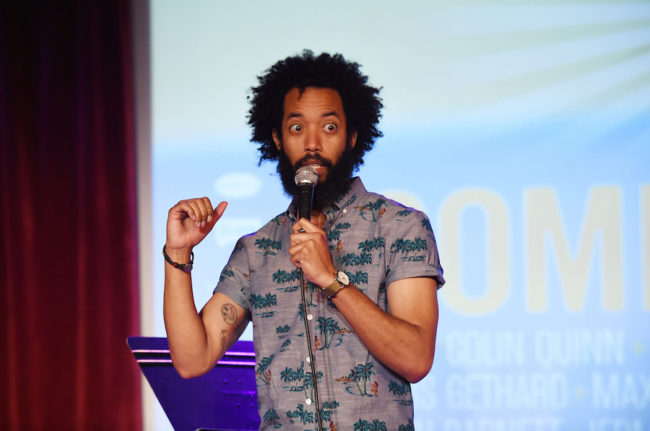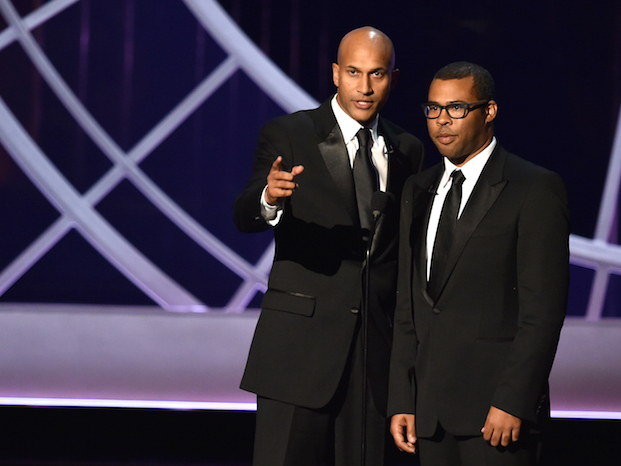
Bryan Bedder/Getty Image
Last week, the Internet exploded after an episode of the WTF! Podcast with Marc Maron went online. The guest was the comedian Wyatt Cenac, who talked about being a writer and correspondent on The Daily Show for several years. He recalled getting into a heated argument with Jon Stewart, the show’s host, over Stewart’s impression of Herman Cain, which Cenac had found troubling:
“[Stewart] got incredibly defensive. I remember he was like, ‘What are you trying to say? There’s a tone in your voice.’
“I was like, ‘There’s no tone. It bothered me. It sounded like Kingfish [a minstrel-like Amos ‘n’ Andy character].’
“And then he got upset. And he stood up and he was just like, ‘F*** off. I’m done with you.’ And he just started screaming that to me. And he screamed it a few times. ‘F*** off! I’m done with you.’ And he stormed out. And I didn’t know if I had been fired.”
Much of the ensuing hullabaloo over Cenac’s recounting of this incident focused on the fact that Stewart, a reliably liberal skewerer of the racial missteps of Washington’s powerful, appeared to have badly mishandled a conversation about race with one of his own staffers.
But less attention was paid to what Cenac had to say about being the only black writer in the room, torn between speaking up or saying nothing and keeping the peace. (Full disclosure: Cenac is a personal friend.) “I gotta be honest if something seems questionable,” he told Maron, “because if not, then I don’t want to be in a position where I am being untrue not just to myself but to my culture, because that’s exploitative. I’m just allowing something to continue if I’m just going to go along with it. And sadly, I think that’s the burden a lot of people have to have when you are ‘the one.’ You represent something bigger than yourself whether you want to or not.”
The Stewart-Cenac exchange illustrates what those of us who are often The Only One In The Room tend to know: It sucks. But it turns out that being The Only One isn’t simply burdensome and annoying on an individual level. There’s evidence that when people feel like they’re The Only One in a group, even a group that professes to care about diversity in its ranks, it actually gets in the way of everything said diversity was supposed to achieve in the first place.
Not long ago, I spoke to Scott Page, a professor at the University of Michigan who studies how people interact in teams and organizations. His work on a mathematical formula to show how greater diversity makes organizations more effective has been explored in The New York Times. Page told me that while there’s been a lot of conversation lately about increasing the numbers of non-white, non-male people in various companies and sectors, it’s left open the question of how many folks those organizations are supposed to be aiming for. Is one enough? Is 10 too many? Can you fiddle the dials to calibrate some sort of ideal workplace diversity score?
Page says it all depends on what you’re trying to achieve. If you simply want more women in the room, that’s easy enough. Hire a woman and stick her at a desk. Your room has, indeed, become more diverse, numerically speaking. Time for happy hour.
But if what you’re going for is bringing new perspectives into your organization, and getting people to actually think differently and come up with new ideas, then a different calculus is needed.
“One question you can ask is how many people of a particular group have to be in a room for them to speak,” Page said. That is, having a woman in a room doesn’t affect a whole lot if she doesn’t feel comfortable speaking up. And while he has found that the presence of just one member of a minority group in a room can positively influence the rest of the group to be more cognizant of their own language and behavior, that’s different from actually hearing out that person’s ideas.
How many people from “a non-dominant group” need to be in a room for that to happen? It depends on a bunch of factors, like the size of the group and some other social dynamics. Individual personalities matter. So does the professional standing of the people in the room. And, of course, the number of people from the “non-dominant group” matters, too — it’s just not the only thing that matters.
When it comes to speaking up about, say, the racial dynamics of a Herman Cain skit, being the Only One in the room can be especially tricky to navigate, says Page. Questions about whether an idea might be offensive often put them “in the position of speaking for all women or for all black people.” (Which, again, sucks.) And depending on the power dynamics of the particular room, Page said, the person they’re questioning might wield a whole lot of power over what happens next.
That’s the kind of situation Cenac found himself in. As he told Maron, after the argument with Stewart, he wasn’t sure whether he’d just been fired. He went outside, sat on a baseball field and broke down. “I was shaking, and I just sat there by myself on the bleachers and f****** cried. And it’s a sad thing. That’s how I feel. That’s how I feel in this job. I feel alone,” he said. Cenac stayed on the show for another year but took something of a back seat for the rest of his tenure. Eventually, he decided to leave altogether, a move that he says was partly connected to his rocky relationship with Stewart.
The tricky thing about being The Only One, though, is that even when you know it might suck, you put up with it to get your foot in the door. That could mean being the only black writer on the staff of The Daily Show — because, come on, it’s The Daily Show — or getting to participate in something way more pedestrian. The point is, you want to be there.
I was reminded of this while watching a recent, much-circulated clip from Comedy Central’s Key & Peele the other day. (The show’s namesake duo announced last week that the current season will be its last.) In the sketch, Key and Peele play two black dudes in college vying to inhabit the implied “one spot” for a person of color in an an otherwise all-white a cappella group on campus. In order to win over the white kids in the groups they’re trying to join, they engage in a series of increasingly hacky, hammy attempts at one-upping each other with a kind of performative, easily identifiable, ingratiating version of “blackness” — that is, a kind of blackness that calls attention to itself while being completely safe and cliche. One breaks into a barbershop-esque scat at the end of a song, much to his white teammates’ delight. “I love that little Motown outro thing!” says one. “Super soulful!”

Kevin Winter/Getty Images
After the white boys leave the room, though, it’s a different story. The black dudes drop the hammy affect and beef over their “territory” — that is, who gets to be the token black guy in the room. (“Do you have any idea how long it took me to infiltrate this group?” one asks the other.)
We later see the pair trying to one-up each other in an improv group, with one making super-obvious jokes — “Why does the cat have to be black?” — to uproarious laughter from their troupemates before the other tags in with a lame joke about his giant penis that also kills.
Being The Only One, in the way Key and Peele are sending up here, is an anxious dance for a lot of folks in the real world: What happens when you’re in a space that seems to have room for Just One, and the racial currency that helped you get in the door suddenly becomes much less rare? And what happens when your racial identity is part of what got you picked for the team, but you know you’ll get booted unless you you play to the crowd, never letting your identity confuse or disrupt?
Tanner Colby teased out this very tension in a great essay over at Slate last year, poking at the racial dynamics of the real-world comedy troupe at Saturday Night Live. Colby points to the long list of black comedians who joined the cast and left unhappily (Chris Rock, Damon Wayans, Yvonne Hudson, Danitra Vance, Dean Edwards, Jerry Minor, Finesse Mitchell, Ellen Cleghorne, etc.) — often because they felt they were being typecast — and the much-shorter list of black comedians who had long, successful careers on the show (Maya Rudolph, Tim Meadows, Kenan Thompson).
The difference, he notes, is that the comedians who struggled tended to come up through black comedy clubs, performing for black audiences, while the ones who flourished tended to come up through super-white comedy proving grounds like Second City and Upright Citizens Brigade, which were more aligned to the sensibilities of their future SNL cast members. That is, they probably had more practice navigating the terrain of white people.
The tricky thing here, of course, is the soft skill of “navigating the terrain of white people” often translates to not upsetting the apple cart, and yet upsetting the apple cart is exactly what advocates for diversity say they want. The tension between those two motivations eventually prompts so many of The Only Ones to throw up their hands and bounce, like Cenac did.
Page, the organizational theorist, told me that’s to be expected when people feel excluded from groups, even ones they’ve joined voluntarily. “If you feel like there’s a group and there’s a vision and you’re not part of that vision, you’re just going to exit,” he said. And he’s found that problem holds true whether we’re talking about entire societies or tiny niche groups. “There’s a sense that you’re going to have to stand up and shout, or you’re going to leave.”
9(MDEwMjQ0ODM1MDEzNDk4MTEzNjU3NTRhYg004))
